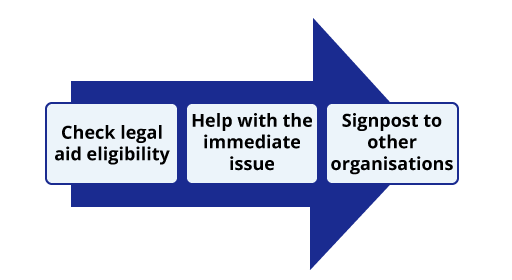3.3 Supporting alleged perpetrators of domestic abuse
Support Though Court supports clients irrespective of allegations made about them. You will therefore come across situations where you are asked to support a client who is alleged to be a perpetrator of domestic violence. It is important for you to manage your boundaries appropriately, and to control any feelings of revulsion, either due to the allegations made against them or the way they behave in the court building.
For example, your reaction could lead you to be under-involved in their case, or not engage fully with their needs. As a Support Through Court volunteer, you are not there to judge, but to support all clients regardless of allegations made about them. However, if you feel that you are unable to support a client - for whatever reason - speak with your Service Manager at the earliest opportunity.
Activity 3
However, there are issues which might arise specifically when supporting a client who is an alleged perpetrator and we will now consider those issues and the care that is needed when supporting such clients.
Please watch this video from Respect and answer the following questions. Please note this video is aimed at healthcare professionals so there are some things that are discussed which may seem out of context at Support Through Court. Don’t worry about this.

Transcript
When discussing the relationship perpetrators may deny, minimize and blame. They may present as having a sense of entitlement, particularly in regard to women. This is often called ‘male privilege’. They use a variety of common excuses to explain their behaviour such as drugs and alcohol, mental health, stress or childhood experiences. They can come across as plausible, sensible and charming.
When supporting alleged perpetrators, remember the advice given in the second domestic abuse module ‘Supporting Survivors of Domestic Abuse’. The same process applies when supporting alleged perpetrators.
First check legal aid eligibility (can they provide evidence of domestic abuse perpetrated against them?). Then help with the immediate issue they have come to see you about. What can they do without a solicitor?
Focus on their case and help them to understand where the domestic abuse fits in with the decision-making process of the court. Finally, consider if you can signpost them to other organisations who may be able to help.
3.2 Why is it important to understand domestic abuse?


